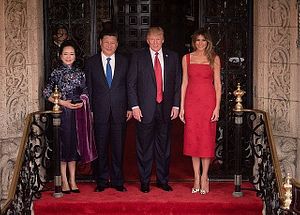Ever since the election of U.S. President Donald Trump, the threat of an uptick in U.S.-China trade tensions have seemed unavoidable. Trump, after all, based his campaign on a promise to return economic prosperity to the U.S. Rust Belt, where manufacturing jobs have dried up, or, in Trumpian parlance, been “stolen” by China. A year into Trump’s presidency, however, we hadn’t seen much action on that front, with Trump instead taking a cordial stance in talks with Chinese President Xi Jinping.
That changed on January 22, when the Trump administration announced that it would levy tariffs on imported solar panels and washing machines, arguing that “increased foreign imports of washers and solar cells and modules are a substantial cause of serious injury to domestic manufacturers.” While the tariffs apply to products imported from around the world, the press release from the Office of the U.S. Trade Representative singled out China’s trade practices as a major concern.
In response, China’s Ministry of Commerce (MOFCOM) called the move “an abuse of trade remedy measures.”
“China hopes the U.S. will use the trade restrictions with restraint, abide by the multilateral trade rules and play a positive role in promoting world economic development,” said Wang Hejun, head of MOFCOM’s Trade Remedy and Investigation Bureau in a statement. “With regard to the erroneous practice of the U.S., China will, together with other WTO members, resolutely defend its legitimate interests.”
On February 4, MOFCOM moved beyond words to actions, opening anti-dumping and anti-subsidy investigations into sorghum imported from the United States. Notably, the MOFCOM statements announcing the investigations admitted that the probes were not triggered by a formal domestic complaint; citing “special circumstances,” thought, MOFCOM said there was “ample evidence” to believe that dumping and subsidies were causing harm to Chinese domestic producers by suturing the market and bringing down prices.
China’s Foreign Ministry spokesperson, in a regular press conference, emphasized that the sorghum probes were “just a normal individual case of trade remedy investigations” – rather than an explicit response to the Trump administration’s recent moves.
The investigation could have a not inconsiderable effect on U.S.-China trade. According to the U.S. Grains Council, sorghum is the third-largest cereal grain crop grown in the United States – and China accounts for the lion’s share of sorghum exports (79 percent as of the 2016-2017 crop year). More concerning, however, is the possibility that this is simply a warning shot. China is the largest export market for U.S. agricultural products, consuming $21.4 billion in U.S. agricultural exports in 2016; further action from China could threaten that considerable total. On the other hand, China can ill afford to jeopardize its own agricultural supplies simply for the sake of making a political point.
Trade action against U.S. agricultural products is China’s preferred method for signaling displeasure with Washington’s own trade decisions. In the early days of the Obama administration, China responded to new U.S. tariffs on tire imports by putting its own tariffs on U.S. chicken products as well as automobiles. Such tit-for-tat exchanges are par for the course in U.S.-China trade relations; the earlier cases were later settled through a mixture of diplomacy and judgments from the World Trade Organization.
In other words, despite Trump’s bombastic campaign rhetoric – he infamously accused China of “raping” the United States – so far, we haven’t seen anything out of the ordinary in the U.S.-China trade relationship. But with Trump promising “a very big intellectual property potential fine” on China in January, the trade frictions are just heating up.

































